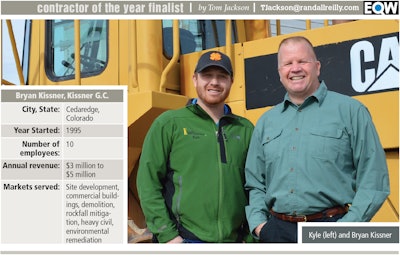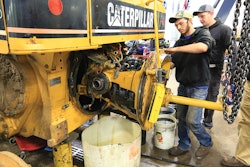
In the steep canyons and rugged terrain of western Colorado, Bryan, his sons and a core crew of about 10 employees at Kissner G.C. tackle a diverse range of jobs from building LEED-certified schools to gargantuan civil engineering projects. Moving a river? It’s just par for the course.
“We had to divert the Colorado River in De Beque Canyon,” says Bryan. And because of an unusually large snowpack in the mountains, Kissner G.C. had to consistently track the snowpack levels, research historical weather data and try to predict worst-case scenarios to develop a six-month extended forecast for all areas feeding the Upper Colorado River Basin. It was determined months in advance that the job had to be finished a month early for fear of everything being washed away in the spring highwater runoff.
“We diverted the river to an old canal structure. Then we put 90-foot-long railroad car bridges over that and used it as our access to the bottom of the river,” Bryan says. “We went 24 hours a day for 30 days straight with a crew of 25 to 30 people, plus subcontracted trucking assets. And we finished 30 days early.”
It was a high stakes job and the early completion came just in time. “Our coffer dams could handle 3,000 cubic feet per second of water. When we took them out, we were at about 2,200 cfs,” says Bryan. “By the next day, the river was running 8,000 cfs.”
The business side
Western Colorado has its share of big construction companies in the energy, commercial construction and civil engineering fields, and Bryan learned his technical tradecraft working for the majors on some big projects. He also listened to what the bonding and insurance guys on these jobs were saying, and when he went out on his own in 1995, he succeeded where others failed partly because of his exposure to such business intelligence.
In his first venture in 1992, Bryan teamed with a partner for light commercial construction and homebuilding, with the partner focusing on homes and Bryan on the commercial side. The company split when Bryan’s partner went north to build high-end custom homes.
In 1995, Bryan refocused his half of the company on increasingly larger commercial construction projects and expanded into heavy equipment work, eventually tackling the highly technical jobs like the river rerouting for fish ladders and screens and installing rockfall barriers over a crumbling mountain side.
Kissner G.C.’s more technical jobs have mostly been for the Bureau of Reclamation and, being government jobs, they required a great deal of organization and documentation. This level of detail might deter other contractors, but Bryan says he’s embraced it and it has made him a better contractor.
“When we do one of their projects, we know exactly the machines we’re going to be using and the number gallons of fuel they will burn, how many hours they will run,” Bryan says. “It is so detailed; it’s unlike anything I’ve ever been a part of.”
The construction and civil engineering community has taken notice of the company’s accomplishments. Kissner G.C. has won several awards from ENR, including its Mountain States Best Project Award for Specialty Projects in 2016. Other accolades came from Colorado Construction and the American Public Works Journal.
Only can-do people need apply
The company has remained small and focused. Both of Bryan’s sons work in the business and have construction management degrees. The oldest, Kyle, went to Colorado State University, and his brother, Nolan, went to Colorado Mesa University. Having his sons in the business has allowed Bryan to work on the company’s growth and strategy and to look for ways to improve profitability and performance.
Kyle started out sweeping floors and running equipment and works today mostly as a project manager and superintendent. Nolan also started young, helping out where ever he could. At age 27, he is an experienced equipment operator, truck driver, GPS operator and works with Kyle and Bryan as an assistant superintendent.
A big part of Kissner G.C.’s success comes from its personnel philosophy. It has a core of about 10 people on the permanent payroll, and for large projects, it can tap a pool of 10 to 15 additional workers in the area who have the skills and the mindset needed. But permanent or temporary, Kissner G.C. only hires can-do people with versatile skills.
“Not everybody fits in with the diversity of what we do,” says Kyle. “If they just want to sit in a hoe all day, it’s not going to work out.”
If you’re going to work at Kissner G.C., you need to be able to run a variety of machines, but also jump out of the cab to rake gravel, shovel dirt, finish concrete, hang drywall – whatever job comes due that day.
“We bring in a lot of young blood, and the diversity of the work keeps it exciting,” says Bryan.
And the Kissner G.C. team is not one to wait on subcontractors. “On a rockfall job they had initially hired a drilling subcontractor, but he wasn’t meeting their production goals,” says Devin Ray with architecture and engineering firm HDR. “So Kissner went out and bought their own rock drills, trained their own people on them and started running their own drills to get the project done in the timeline needed.”
Innovative shop
In addition to the versatile skills of his crews, Bryan encourages innovative thinking when it comes to attachments, problem-solving and anything shop related.
“I’ve seen them build a lot of special tools and attachments for equipment,” says David Tindall of Riverbend Machinery. “They could teach other contractors a lot about thinking outside the box.”
For example, before grading a large field of 1 ½-inch rock, Kissner’s crew welded a section of 10-inch pipe on the edge of an excavator bucket and used the round section of the pipe to level the gravel. “It saved us a massive amount of hand work,” says Bryan.
Another time they were faced with having to compact a layer of sand, but the small footprint of the 3-by-3-foot plate on the compactor created too much density. So they removed the small plate and fabricated their own 6-by-6-foot plate in the shop.
The company mechanic, Travis Trembly, is also a carpenter, welder and operator. “This kid can make some stuff run,” says Bryan. And when Travis is not fixing equipment or inventing new attachments, he turns his attention to the fleet trucks.
Bryan is not big on brand new trucks. They’re expensive and don’t contribute to the bottom line, he says. So Travis keeps the company’s older trucks in good working order.
Business management
In addition to saving money on trucks, Bryan is conservative with his equipment budget. He turns over major machines at the 5,000- to 7,000-hour mark, and because he is meticulous about maintenance and keeping his machines clean, he typically gets top dollar for his used iron.
And as it turns out, his exposure to business experts early in his career has continued to benefit the company. It’s helped him focus on the accounting, and with his bonding experience, he’s been able to help ensure the company gets paid on time.
Bryan also credits the diversity of his jobs with keeping the company in good shape during the recession. Things slowed, but there was always enough in the pipeline to keep his core guys busy.
And the company has forged strong ties in the industry over the years, enabling it to maintain a lineup of lucrative work.
“We’re pretty picky about the jobs we chase and who we work for,” Bryan says. “It’s people we know and have relationships with, and those take time.”










